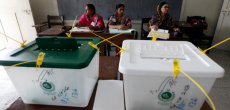[vc_row][vc_column][vc_column_text dp_text_size=”size-4″]The Election Commission of Pakistan (ECP) has made the decision to postpone polling in four constituencies, citing the unfortunate demise of candidates as the primary reason for the deferment. Originally scheduled for February 8, voting in PK-91 Kohat has been delayed following the death of candidate Asmatullah Khattak. Similarly, residents of NA-8 and PK-22 Bajaur will not be able to exercise their voting rights as planned, as the killing of candidate Rehan Zaib has prompted the postponement of polling in these constituencies. Another constituency affected by such a tragic circumstance is PP-266 Rahim Yar Khan, where the passing of candidate Israr Hussain has led to the delay of elections.
The Election Commission of Pakistan has officially communicated that the polling activities in these four constituencies will be rescheduled and conducted after the completion of the general elections. This decision reflects the ECP’s commitment to ensuring a fair and transparent electoral process, acknowledging the exceptional circumstances surrounding the unfortunate demise of candidates.
Read more: Shaheen Shah Afridi Encourages Participation In Feb 8 Elections
As Pakistan gears up for its 12th general election on February 8, the anticipation is overshadowed by various challenges, including the threat of terror attacks, concerns related to censorship, and heightened polarization within the political landscape. These challenges underscore the complexities and nuances surrounding the electoral environment in the lead-up to the polls.
The decision to postpone polling in specific constituencies due to the death of candidates adds a somber note to the electoral proceedings. The untimely demise of Asmatullah Khattak in PK-91 Kohat, Rehan Zaib in NA-8 and PK-22 Bajaur, and Israr Hussain in PP-266 Rahim Yar Khan has necessitated a reevaluation of the election timeline in these areas. Such instances highlight the unpredictability and the unforeseen events that can impact the electoral process, prompting authorities to take necessary measures to address the unique challenges that may arise.
The ECP’s commitment to rescheduling the polling in these constituencies after the general elections indicates a meticulous approach to maintaining the integrity of the electoral process. This decision ensures that voters in PK-91 Kohat, NA-8, PK-22 Bajaur, and PP-266 Rahim Yar Khan will have the opportunity to participate in the democratic process once the circumstances allow for a fair and secure voting environment.
The broader context of the upcoming general election is marked by a combination of anticipation and concern. The shadow of potential terror attacks raises security considerations, while concerns about censorship and political polarization contribute to the overall complexity of the electoral landscape. Navigating these challenges requires a delicate balance between ensuring the safety and security of voters and candidates and upholding the principles of democratic governance.
In conclusion, the postponement of polling in four constituencies due to the unfortunate demise of candidates adds a layer of complexity to the preparations for Pakistan’s 12th general election. The ECP’s decision to reschedule the elections in these constituencies underscores its commitment to conducting a fair and transparent electoral process, even in the face of unforeseen challenges. As the nation prepares to cast its votes, the resilience of the democratic process is tested, and efforts are made to address and overcome the multifaceted challenges that define this electoral moment.[/vc_column_text][/vc_column][/vc_row]











